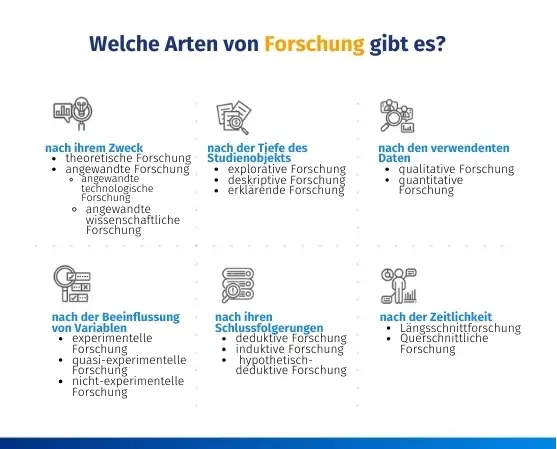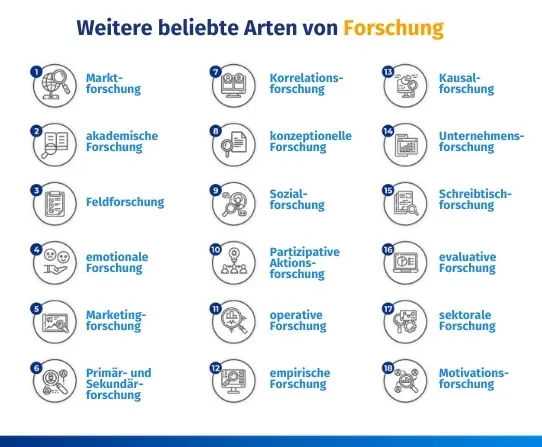Market research
There are different Types of research, and each can serve you at different times depending on the needs of your study. It's about following a process and applying it to solve a problem or create new knowledge.
Applying different research models can ensure that you create reliable parameters to confirm or negate a hypothesis.
This way you can ensure that the project you undertake provides valuable information to the industry or society.
CONTENT
- 1 Types of research and their classification
- 1.1 Types of research by purpose
- 1.2 Types of research according to the depth of the subject of study
- 1.3 Types of research according to the data used
- 1.4 Types of research after manipulating variables
- 1.5 Types of research by inference
- 1.6 Types of research according to their temporality
- 1.7 Other popular types of research
- 2 Why is it important to know the types of research?
- 3 Conclusion
- 4 1:1 Live Online Presentation: QUESTIONPRO MARKET RESEARCH SOFTWARE
- 5 Try software for market research and experience management now for 10 days free of charge!
Types of research and their classification
Generally, a type of research is chosen to improve the understanding of the study, especially when data collection is to be carried out on a specific topic.
Below are all types of research according to the following aspects:
Types of research by purpose
There are two types of research depending on their purpose:
Theoretical research: This type of research aims to obtain information of various types, even if this knowledge is not applied, but only to have general knowledge.
Applied Research: At applied research is about finding strategies to achieve a specific goal and putting them into practice. It is divided into two types:
- Applied technological research: It serves to gain new knowledge and put it into practice to improve people's lives.
- Scientific applied research: The Scientific Research is used to measure certain variables to predict behavior. It is generally applied in the area of goods and services.
Types of research according to the depth of the subject of study
The types of research also include the degree of depth. It can be divided as follows:
Exploratory research: Exploratory research aims to examine and analyse specific information that has not yet been studied in depth. This means that it serves to find an initial approach in order to be able to carry out more detailed research later.
Descriptive research: It focuses on a detailed account of the phenomenon under study, its characteristics and its design. She does not care about the causes or consequences of the phenomenon, but only wants to have a clear idea of how to understand it.
Explanatory research: With this type of research it is possible to determine the relationship between the cause and consequences of a particular phenomenon. In this way, it is possible to find out why and how the phenomenon reached its current state.
Types of research according to the data used
Another type of research is based on the data used. It can be classified:
Quantitative research: This type of research is carried out to obtain and evaluate information using a statistical and mathematical approach. It uses a large amount of data from various sources to analyse it and find discrepancies in the data.
Quantitative data is usually presented in the form of charts, tables and statistics. They can be collected using surveys or questionnaires and are then used to find a correlation or pattern of behavior that may be useful for the research topic.
Qualitative research: It is a research process that enables a deep understanding of the problems. It helps obtain information about a specific topic by examining behaviors, emotions, and other aspects of human psychology that are open to interpretation.
Qualitative data can be collected in the form of case studies, interviews, focus groups, etc. They are mostly descriptive and can be easily explained using words, numbers and pictures.
Types of research after manipulating variables
There are different types of research depending on the degree of manipulation of the variables. These can be:
Experimental research: Experimental research usually used in sociology and psychology, physics, chemistry, biology and medicine, etc. It is a series of research designs that use manipulations and controlled tests to understand causal processes.
Generally, one or more variables are manipulated to determine their effects on a dependent variable.
Quasi-experimental research: A unique methodology characterized by no control group, no random selection, no random assignment and/or no active manipulation.
Non-experimental research: At non-experimental research The researcher cannot control, manipulate or change the variable, but relies on interpretations, observations or interactions to reach a conclusion, so must rely on correlations, surveys or case studies and cannot demonstrate a true cause-and-effect relationship.
Types of research by inference
The types of research can be classified according to their conclusions as follows:
Deductive research: This type of research focuses on examining reality and verifying or refuting the premise being verified. So if the premises are correct and the deductive method is applied correctly, the conclusion will also be correct.
Inductive research: It begins with observations and theories are proposed towards the end of the research process as a result of the observations.
This approach aims to generate meaning from the data collected in order to identify relationships that contribute to the formation of a theory. Generally, it is based on learning from experience. Patterns, similarities and regularities are observed to reach conclusions.
Hypothetico-deductive research: It is carried out to create a scientific theory that takes into account the results obtained through direct observation and experiments and predicts additional effects through inference, which can then be verified or refuted by empirical evidence from other experiments.
Types of research according to their temporality
The types of research can also be divided according to their temporality. These are as follows:
Longitudinal research: This type of research is characterized by observing a person or event over a period of time to determine the changes that occur.
Cross-sectional research: A cross-sectional study compares the characteristics of different people at a given point in time. It is used in developmental psychology, social sciences and pedagogy.
Before choosing any of the types of research, you need to define the goals of your research, determine your knowledge about them, and then find the appropriate method to achieve that goal.
It is important that the researcher has clearly defined the focus of their study before beginning the process and that they select the appropriate data collection tools that will achieve the objectives.
Other popular types of research
In addition to the types of research we read about above, there are others that are very popular. Each of them is mentioned below:
Market research: This type of research provides insight into consumers' purchasing habits and preferences, which gives companies insights into their industry, estimates the prices of their products, etc.
Academic Research: This is a process that allows both the educational sector and researchers to expand their knowledge to solve a problem, set goals and through formal and scientific Research methods Ask questions in order to solve them or use existing theories.
field research: The process of collecting new data from primary sources for a specific purpose. Field research is best suited to obtaining qualitative information through the researcher's observation, understanding and interaction with people in their natural environment.
Emotion research: This is one of the most used types of research today, as it consists in conducting tests that determine the facial expressions and emotions of the participants.
Marketing research: These types of research are conducted on a specific target group to gain insights into their behavior. This allows companies to get to know the consumers they are targeting in depth.
Primary and secondary research: Primary research is a combination of qualitative and quantitative research where the companies engage with the end users to collect relevant data. Secondary research uses external sources and published information to collect relevant data and make better decisions.
Correlation research: This type of research consists of measuring two variables and finding the statistical relationship between them.
Conceptual research: It is done through observation and analysis of data on a particular topic. This is not a practical process, but rather uses concepts and ideas to develop new theories or interpret existing theories from a different perspective.
Social research: This is about learning more about people and societies in order to develop products and provide services that meet their needs.
Participatory action research: The process is carried out with the aim of enabling researchers and participants to understand and improve the practices they carry out and the situations in which they find themselves. This process is directly related to action and is influenced by an understanding of history, culture and local context, as well as social relationships.
Operational research: This is an analytical research technique carried out with the aim of solving a problem, predicting outcomes and making better decisions in an organization with complete data.
Empirical research: This type of research is research in which information can only be obtained by conducting concrete and verifiable evidence using qualitative and quantitative research methods.
Causal research: This is a type of research on an experimental and statistical basis. It consists of determining the relationship between variables and the effects of a change in the independent variable.
Business research: This process consists of obtaining detailed information from all departments of a company to determine the most profitable products and services and maximize sales.
Document research: At Document research is about obtaining information from existing material and selecting appropriate information for the study. This gives researchers the opportunity to interpret and improve new documents.
Evaluative research: These types of research are conducted with the aim of determining the purpose of a study rather than the specific method. That is, it is about evaluating the means used to achieve the results. This process makes it possible to expand knowledge and make better decisions, which are then put into practice.
Section research: Here qualitative information is only collected once from a specific sample. The data collected is used to delve deeper into phenomena occurring in a community.
Motivation research: These types of research are conducted to explain the reasons behind consumers' behavior, understand their needs and their relationship with a product or service. In this way it is possible to develop strategies that influence them.
Why is it important to know the types of research?
Obtaining evidence relevant to the research problem typically requires determining the type of research that will be used to test a theory, evaluate a program, or accurately describe a phenomenon.
However, researchers begin the process too early before determining what information they need to answer the study questions.
If one of the types of research is not selected in advance, there is a risk that the conclusions drawn will be weak and unconvincing and, as a result, the overall problem of the study will not be adequately addressed.
Conclusion
This brings us to the end of this overview of the different types of research you can use to gain the insights you need as part of your academic, commercial or social goals.
Don't forget that for any type of online research, QuestionPro has the tools you need to carry it out easily and effectively.
Create a free account to take advantage or request a demo of our platform now and learn all the features of our different licenses.
1:1 live online presentation:
QUESTIONPRO MARKET RESEARCH SOFTWARE
Arrange an individual appointment and discover our market research software.
Try software for market research and experience management now for 10 days free of charge!
Do you have any questions about the content of this blog? Simply contact us via contact form. We look forward to a dialogue with you! You too can test QuestionPro for 10 days free of charge and without risk in depth!
Test the agile market research and experience management platform for qualitative and quantitative data collection and data analysis from QuestionPro for 10 days free of charge
FURTHER KEYWORDS
SHARE THIS ARTICLE
KEYWORDS OF THIS BLOG POST
Types of research | Research | species
FURTHER INFORMATION
- Research Synthesis: Understand your research results
- Synthetic data: what they are, types, methods and uses
- Research Process: Steps to conduct the research
- Synthetic data generation: techniques and perspective
- Digital behavioral data: what it is, its importance and risks
- Data filtering: what it is, benefits and examples
- Data Science and Artificial Intelligence: Which is Better?
- Big Data and Artificial Intelligence: How do they work together?





